Zimbabwe’s failure to formalize and “technocratize” Chrome buying and exporting has led to the exploitation of local miners by buyers who bargain predatorily leaving the miner with very low returns that will not sustain mining development or growth experts have said.
Rudairo Dickson Mapuranga
Zimbabwe has the world’s second-largest chromium reserves after South Africa, with about 12% of the global total. However, the country is not among the top Chrome producing nations.
Due to the closure of Zimbabwe Iron and Steel Company (Zisco), the country’s leading steel-making company, the Chromium market in Zimbabwe is near to zero with the country relying only on exporting raw chrome.
On paper, Zimbabwe has the best chromium ore grade in the world which gives the country’s chrome an advantage on the international market over other countries. However, since buying and exporting of chrome in Zimbabwe is not properly regulated and modernly formalized the appetite of the country’s chrome on the international market is very weak.
Zimbabwe’s all-weather friend, China is the world’s largest chrome consumer, Chinese demand for chromium is mainly driven by stainless steel. The country does not have its own chromium reserves and relies on imports. The country has failed to capitalize on Chinese chrome appetite due to untransparent marketing systems and poor marketing strategies.
The Minister of Mines and Mining Development Winston Chitando is on record saying that the country’s chrome production needed to be improved due to the increasing consumption in carbon and stainless-steel production world over, however, production of chrome in Zimbabwe has been rather decreasing than increasing.
“Chrome ore production will need to increase in line with increasing consumption in carbon and stainless-steel production, therefore there is a need for significant investment in developing the mining capacity of the country from exploration through to production,” the minister said.
According to Zimbabwe Miners Federation (ZMF) Mashonaland Central Chairperson Mr. Masango Mahlahla the country’s chrome industry has the potential to establish a USD Billion dollar industry with the small-scale sector able to generate over USD300 million in export sales.
“Small scale chrome miners held the potential to generate over USD 340 million in export sales revenue along with Government direct tax earnings of over USD 42 million.
“Over the last three years our continued research into chrome highlights that Zimbabwe Chrome production has the potential to become a Billion USD industry,” Mahlahla said.
There is a need for government-led reinvestment into the industry in the form of infrastructures such as roads, power, weighbridges, formal marketplaces for all minerals, along with the implementation of export and domestic sales pricing models to support Chrome trade and the creation of chrome sales depots to increase market visibility.
According to Norton Miners Association Chairperson, Mr. Privelage Moyo, many Chinese investors have tried to buy Zimbabwean chrome, however, due to low production, there is no Zimbabwean mining company that can sustain exporting the required tonnage frequently to the extent that, although the chrome is the best grade in the world, it is now being used as a blending steel-making production due to its limited supply.
Moyo further went on to say that, it was important for parastatals to be headed by technocrats who in turn would be independent to pass decisions without political or external influences that are not growth or development-oriented.
“Our Chrome is now used as a blending product in steel making yet it has some of the best grades in the world.
“Parastatals that are key to the economy should be headed by technocrats, who will as well create the best team, not on political grounds,” Moyo said.
It should be noted that the moment chrome production increases, countries will scramble to export chrome from Zimbabwe thus, the government needs to make sure that miners are supported for resuscitation.
Zimbabwe’s chrome market is dominated by predatory buyers who have formed domestic cartels that purchase chrome at an average price of US$12 per tonne instead of nearly US$90.
Chrome ore producers face major growth challenges because there is limited access to the international export market which reduces the opportunities for chrome producers to earn much-needed foreign currency to help resuscitate operations.
Zimbabwe, as a nation, is therefore losing significant foreign currency and tax revenues while at the same time opportunities to re-invest into production growth and efficiencies are being lost.
This article first appeared in the September 2020 Mining Zimbabwe Magazine issue
.png)




